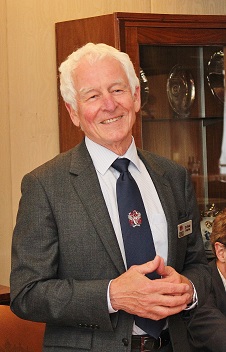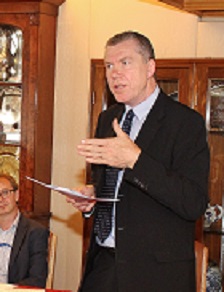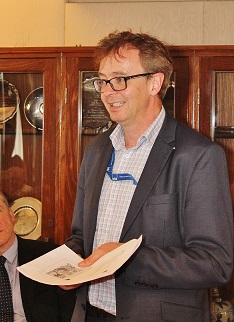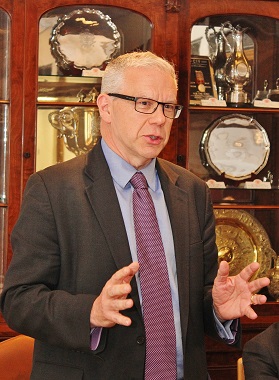Dr Simon Davey, Freeman, Scientist and proud management consultant! argues the case...
A balmy evening in mid May saw the Company’s latest Change Lecture in Guildhall – “Do Consultancy Firms Make Hospitals Worse?” The case for the ‘prosecution’ was brought by the authors of the research study, Professor Andrew Sturdy and Ian Kirkpatrick with Alan Leaman, Chief Executive of the Management Consultancies Association, arguing for the ‘defence’. Our esteemed Dr Bob Harris was in the chair.

Third Warden Bob Harris - Chair
The Change Lecture subject arose from a newspaper jumping on conclusions Messrs Sturdy and Kirkpatrick had drawn in a recent paper “The impact of management consultants on public service efficiency” in Policy & Politics. (You can read the original paper via the link at the bottom of this article.)
To quote: “Public sector organisations often make use of management consultants in policy implementation, but we know little about the outcomes. The paper reports one of the first quantitative evaluations of the impact of consulting advice on efficiency of public sector organisations. We employ an extensive dataset covering English NHS acute care hospital trusts over a four-year period. Based on PCSEs estimations, the findings show a significantly positive relationship between consulting expenditure and organisational inefficiency. These results lend support to critical accounts of management consulting, highlighting the need for organisations to be circumspect in deciding whether and how to use these services.”

Professor Andrew Sturdy
Prof Sturdy opened the bear pit with a reminder of the similarities between academia and management consultancy (the more-in-common-than-different approach). The value of external knowledge; the perspective of expertise; professional clients and professional consultants.
Then to the killer punch – How do we assess the value of management consultancy? It’s rarely entirely transparent; the best projects are co-produced (consultancy and client working together); and there is a marked absence of rigorous, peer reviewable data. And yet… most advice should lead to some efficiency improvement somewhere, shouldn’t it?
We learned that around £640 million had been spent in the period under review (around £1.2m per trust); yet trusts who spent more on consultants proved marginally worse in efficiency terms. Even the highest spenders weren’t getting effective return on investment but at least their consultants didn’t make things ‘worse’.

Co-author Ian Kirkpatrick
But who were these ineffective management consultants? Whilst not naming names, the role of McKinsey in the NHS is well known and as the old ‘you never got fired for buying IBM’ (at least not in the old days), the procurement of McKinsey was perceived to have a positive signalling effect.
We learned it wasn’t just inefficient trusts, it was indeed that the consulting generated an increase in inefficiency. It’s not just broken, we helped break it.
But, as good (and wise) academics do, they raised the following caveats: is commissioning flawed? are projects not being implemented right? and how can we better explain outcomes?
And from the blue corner came forth Alan Leaman, Chief Executive of the Management Consultancies Association. The first observation – not spending money on management consultants didn’t equate to more spending on nurses was contestable. The proportion perspective was more valid – we were talking about 0.5% of the total NHS spend; proportionately an industry low on external advice (including in comparison to other non-profit areas).
Public sector data on consulting was recognised as very crude – the data would include contractors, interim CEOs as well as formal management consultancy spend with firms. In some less efficient trusts, the spend might cover more basic vacancies.
Mr Leaman reminded us that consulting activities is more than efficiency – it could be improved relationships; IT; strategy; procurement improvement; and - the consultants' golden egg - didn’t the best consulting projects often uncover chronic underspending in key areas?

Alan Leaman, Chief Executive of the
Management Consultancies Association
The academics had missed a trick in that the best consulting work may be outside hospitals. Key positive examples were shared, including the new model of care in Devon that had reduced length of stay in hospitals. We knew there were vested interests in the NHS fighting against change. We needed to unpick individual cases and evaluate impact. We needed to:
- Understand and document the characteristics of success and those of sub-optimal performance
- Promote more transparency and scrutiny
- Increase value, not just reduce expenditure (perhaps leave the surgical scalpels to the medics?)
- Understand the conditions and behaviours which make value successful
So after a technical tie on opening statements, the audience was moved to weigh in to the argument…
Mike Barnato reminded us of the 3 C’s. Comparison – different roles weren’t always about efficiency,; causation – outcomes co-produced and good consulting requires a good client, and culture – the need to understand the culture and environment we were trying to impact.
Response – yes, some advice won’t lead to efficiency. MC 1 Academics 0.
Our esteemed statistician, suggested that removing some of the outliers (the higher spenders) might make the inefficiency less significant but the challenge was rather rebuffed. (check out the graphs for yourself in the paper – link below)
We wondered whether trusts commissioned management consultancies because of central NHS pressure and political pressures in order to tick boxes? Whether local client resistance played a part? After all, it’s difficult to support a hostile witness/uncooperative client. We felt that consultancies might not be looking at the holistic system and in some cases be naïve with very limited experience of the area.
And it was time to bash Andrew Lansley! The former Secretary of State for health did make a bit of a mess and his reforms have led to greater inefficiencies; but if the regulators and authorities mandate the work, shouldn’t management consultants do it?
(No! came a resounding cry from the back – and front.)
But how do we make this better? What would you prescribe Doctor?
Well, take the following…
- ‘Supply performance’ – define at the start of the assignment (selection of supplier or project) the key outcome measures. If procurement experts can do it, so can we.
- Be clear we are measuring the right things (there is a distinction between acute care for a narrow group and wider outcomes for a population)
- Learn from other countries (though possibly not the US)
And in the spirit of the Livery, we were back to ethics.
“Not all NHS organisations knew what they wanted or briefed well. Some consultancies will just take the money. There needs to be a holding to account, a proper governance.”
Management consultants stealing your watch to tell you the time when you didn’t know that was what you wanted? Who’d have thought?
But it uncovers a fundamental point. The client is the only one who can truly know what they want and need and the only partner to be able to fully hold the agent (consultancy) to account. Yet, in my work at least, the most crucial and often valuable part of my assignment, is establishing clarity of brief, determining explicit positive value for why I’m there and helping build (or at least encourage) the governance and structures which keep us all (client and consultant alike) honest during the more difficult parts of the assignment. It’s not sufficient to say I think this is what you want so I’ll take the money and do it. It’s not, and those that think different bring shame on the profession.
And our academics reminded us: If any project is misconceived, and many are, it is set up to fail and no procurement process in the world will help.
So what might we do?
- Establish KPIs at the level of the whole health economy – now there’s an assignment!
- Evaluate and research projects rather than just the macro – take 5 to 10 case studies of both excellent and failing projects, look at the ingredients and offer recommendations. Hell, we’ve been doing that with IT projects for years. And if we need anonymity for the projects so be it.
So was it time for an academic mea culpa?
Partly. Yes, the current research doesn’t answer the question. But the question is worth asking.
And there was a concern (from the MC side of the room) that the disproportionate power of medical consultants can lead to management consultants being stuck in the weeds. Too many brains, too little positive action?
Which leaves the final question of ethics – do the right job or take the money? We acknowledged the perverse drivers and incentives (both in the NHS and within firms) but ultimately this was a matter of judgement and the wider need to protect and reward those who do the right thing. “Ethical against all odds.”
Perhaps we do little harm, but we could do more good.
References
- The impact of management consultants on public service efficiency https://doi.org/10.1332/030557318X15167881150799
- Hospitals waste more money after hiring management consultants https://www.telegraph.co.uk/news/2018/02/21/hospitals-waste-money-hiring-management-consultants/
- MCA’s Nine Consulting Excellence Principles https://www.mca.org.uk/consulting-excellence/the-nine-consulting-excellence-principles/
- LSE blog – Bringing inefficiency to the NHS http://blogs.lse.ac.uk/politicsandpolicy/using-management-consultancy-brings-inefficiency-to-the-nhs/
- Why the silence on the poor rate of return from NHS consultancy spend? (Ian Kirkpatrick responds to industry criticism) https://www.hsj.co.uk/finance-and-efficiency/why-the-silence-on-the-poor-rate-of-return-from-nhs-consultancy-spend/7022321.article
- VODcast by Andrew Sturdy https://www.youtube.com/watch?v=cw8S8D70DDg
Dr Simon Davey, Freeman

@drsimondavey